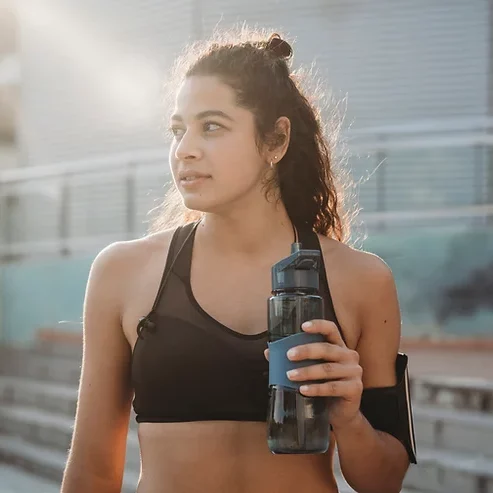Summer is just around the corner and we’re all looking forward to longer, warmer days. But along with the summer sunshine comes the heat… and the sweaty workouts!
If you’re training or running in the heat, staying hydrated is imperative. But with so many sports drinks on the market, you may be wondering which one you should choose to replace the electrolytes lost when you sweat? And do you really need that electrolyte replacement beverage anyway? Why can’t you just drink water?
In this week’s blog post, we’ll look at why hydration matters, and the Do’s and Dont’s of replacing lost electrolytes.
Understanding Why Hydration Matters
We sweat or perspire more when we workout, and that’s healthy! Sweating is the natural process that regulates our core body temperature.
If the body begins to overheat during exercise, your nervous system activates the sweat glands to release perspiration (a water-and-electrolyte solution) via your skin’s pores, bringing down your body temperature when it hits outside air, sweat evaporates off your skin, cooling you down and minimizing overheating in the process.
This is why you naturally deplete your electrolyte levels faster as you increase the intensity of your workout. And electrolyte levels can and should be restored.
When your electrolyte levels are balanced, this ensures that the muscular, cardiac, and nervous systems are functioning properly. Balanced electrolyte levels are also vital for maximizing training and improving performance. When your electrolytes are not balanced, you increase your risk of suffering muscle cramps, becoming fatigued, experiencing side stitches during your workout, or worse (don’t worry, we’re getting to that)!
Do stay hydrated while you workout
Before you head outside to bike, run, or participate in any sport, make sure that you are well-hydrated. Don’t wait until after your workout to down that sports drink! Try to drink about two cups of fluid two hours before you exercise.
While running or training, replace electrolytes and fluids that you lose through sweat by drinking a hydrating sports drink with sufficient sodium to replace the electrolytes depleted through perspiration. Look for electrolyte sports drinks or hydration mixes and powders that can be mixed with water.
The ideal sports drink will contain carbohydrates for energy and provide a balance of all the key electrolytes (potassium, sodium, magnesium). 14 fluid oz of the drink should contain around 45 mg of calcium, 55 mg of potassium, 50 mg of magnesium, and 380 mg of sodium.
The sports drink’s carbohydrates should come from sucrose, glucose, and/or fructose, which the body can easily absorb. Powerade, Gatorade and similar sports drinks have been developed to quickly replace fluids and increase the sugar (glucose) circulating in your blood. Additionally, these drinks can give you a helpful burst of energy during exercise.
Don’t rely on thirst alone as an indicator of how much you need to drink. During exercise, aim to drink 4-6 ounces every 15-20 minutes to ensure that your muscles are well-hydrated. Carry a water bottle with about 16 oz (2 cups) with you if you’re planning a walk, run, bike ride, or even gym workout that will last for an hour or longer.
If you’re concerned about calories, rest assured that most sports drinks are well-diluted and have a relatively low calorie count. If the thought of drinking a sweet beverage during a workout doesn’t appeal to you, consider that there are a wide array of sports drink flavors available. Find one you can tolerate and you’ll be more likely to hydrate… and enjoy it!
Pro Tip: Avoid carbonated sports beverages, as the bubbles often cause digestive distress during a workout. In case you haven’t put this together, soda and alcohol are never a good idea during a workout (carbonated or not)!
Don’t skip that post-workout hydration!
Replacing electrolytes depleted while training is always important, but even more so in the heat. Since you won’t stop sweating the minute you finish exercising and your body will still lose some electrolytes through perspiration post-workout, drink up after you’re finished running or training to avoid electrolyte imbalances.
Electrolyte imbalances can lead to temporary symptoms such as nausea, fatigue, and muscle cramps. If electrolyte levels remain imbalanced, this can prevent your muscles from recovering in time for your next workout. Kidney failure, seizures, heart rhythm disorders, and other long-term conditions may also result from electrolyte imbalances.
To hydrate post-workout, select sports drinks that are high in electrolytes containing low amounts of simple sugars, instead of drinks and mixes with high amounts of artificial and simple sugars. Drinking water is also an integral part of rehydrating throughout the day, as your body loses water faster than it loses electrolytes.
Do enjoy some coconut water… post-workout
Coconut water is often marketed as a good electrolyte source. And since it is made from a whole food, it’s easy to make the assumption that coconut water is a healthier alternative to traditional sports drinks.
Traditional sports drinks and coconut water have a lot in common and may contain the same amount of calories. But if you are sweating significantly during high-intensity or prolonged exercise, coconut water is not the best choice.
According to sports nutritionist Nancy Clark, author of “Nancy Clark’s Sports Nutrition Guidebook,” coconut water is high in potassium and low in carbohydrates and sodium. Unfortunately, this is not what an athlete’s body needs during demanding workouts, especially in the heat.
Instead, choose a hydrating sport drink, mix, or electrolyte supplement with sufficient sodium to replace the electrolytes you lose from sweating, and to provide some energy for your workout. Save the coconut water for sipping on
in between workouts!
Coconut water can be a good source of amino acids, the building blocks of protein, which are necessary for repairing tissues after a challenging training session. And coconut water contains antioxidants proven to help neutralize oxidative stress and free radicals produced when running and working out.
Don’t be afraid to geek out on the science behind this
At this point, hopefully you realize that hydration with an emphasis on sodium replacement is the priority during your actual workout. If you really want to be precise, weigh yourself before you start exercising and again when you finish.
During exercise, the average person sweats between 0.8 to 1.4 liters per hour, which is the equivalent of one to three pounds of body weight. You can determine the specific rate at which you sweat by performing the following test:
Sweat Rate Test
- Just before a one-hour run at race pace or a high-intensity workout, weigh yourself without any clothes on
- During that workout, track how much water you drink in ounces
- Immediately after your one-hour workout, strip down, wipe yourself down to remove excess sweat from your skin, and weigh yourself again
- Subtract your post-run weight from your pre-run weight. Convert that number to ounces
- Take that number and add to it the amount in ounces that you drank during your workout (if you lost one pound and consumed 16 oz. of water, then your hourly fluid loss would be 32 oz)
- The amount of fluid that you should be consuming every 15 minutes during a high-intensity workout or run lasting one hour or longer can be found by dividing your hourly fluid loss by four
Since temperature differences will impact your sweat rate, retest that rate later in the summer. Consider retesting your sweat rate as your fitness level improves, as this will also affect that rate.
The average sweat rate is 17 oz. per hour for a healthy individual. Consult a doctor if you perform the sweat rate test and observe that your sweat rate is notably more or less than this.
Do Prevent Hyponatremia
Exercise-associated hyponatremia (EAH) is a low blood plasma sodium level that can develop during exercise. With this EAH, the body retains too much water, which dilutes the amount of sodium in the blood and results in sodium levels that are dangerously low.
There are a few different causes of this condition, including dilution of sodium levels in the blood that is triggered by the excessive consumption of fluids. Hyponatremia can be intensified by sodium lost in sweat during prolonged workouts.
Symptoms of EAH include confusion, nausea, headache, lethargy/ fatigue, and muscle cramps. And medications and hospitalization may be required to treat it.
To avoid hyponatremia and increase fluid retention in your bloodstream, consume sports drinks that contain sodium. A 14 fluid oz sports drink containing about 380 mg of sodium can help decrease the dilution rate in the bloodstream, while sustaining blood sodium levels and blood volume better than plain water can.
The Takeaway
ot all fluids are the same, and knowing which sports drinks contain certain electrolytes is key to safely hydrating and effectively recovering after a hard workout. Also key is knowing the rate at which you sweat (and in turn the amount of fluid you should be consuming during and after a workout) by conducting a sweat test.
Rather than undermine your performance and cheat yourself of fitness gains, put these hydration principles into practice as you workout this summer! For additional support in taking your fitness to the next level, contact the performance trainers and physical therapists at Change the Game.
We’re here to help you reach your goals. Find out more about the health and fitness services we offer to greater Wilmington, NC and beyond!


